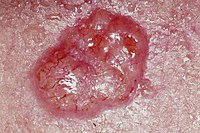
Photo from wikipedia
Experimental evidence suggests that alcohol induces cutaneous carcinogenesis, yet epidemiological studies on the link between alcohol intake and skin cancer have been inconsistent. The European Prospective Investigation into Cancer and… Click to show full abstract
Experimental evidence suggests that alcohol induces cutaneous carcinogenesis, yet epidemiological studies on the link between alcohol intake and skin cancer have been inconsistent. The European Prospective Investigation into Cancer and Nutrition (EPIC) is a prospective cohort initiated in 1992 in 10 European countries. Alcohol intake at baseline and average lifetime alcohol intake were assessed using validated country‐specific dietary and lifestyle questionnaires. Hazard ratios (HRs) and 95% confidence intervals (CIs) were estimated in Cox models. A total of 14 037 skin cancer cases (melanoma: n = 2457; basal‐cell carcinoma (BCC): n = 8711; squamous‐cell carcinoma (SCC): n = 1928; unknown: n = 941) were identified among 450 112 participants (average follow‐up: 15 years). Baseline alcohol intake was positively associated with SCC (>15 vs 0.1‐4.9 g/day: HR = 1.44, 95% CI = 1.17‐1.77; Ptrend = .001), BCC (HR = 1.12, 95% CI = 1.01‐1.23; Ptrend = .04), and melanoma risks in men (HR = 1.17, 95% CI = 0.95‐1.44; Ptrend = .17), while associations were more modest in women (SCC: HR = 1.09, 95% CI = 0.90‐1.30; Ptrend = .13; BCC: HR = 1.08, 95% CI = 1.00‐1.17, Ptrend = .03; melanoma: HR = 0.93, 95% CI = 0.80‐1.08, Ptrend = .13). Associations were similar for lifetime alcohol intake, with an attenuated linear trend. Lifetime liquor/spirit intake was positively associated with melanoma (fourth vs first quartile: HR = 1.47, 95% CI = 1.08‐1.99; Ptrend = .0009) and BCC risks in men (HR = 1.17, 95% CI = 1.04‐1.31; Ptrend = .14). Baseline and lifetime intakes of wine were associated with BCC risk (HR = 1.25 in men; HR = 1.11‐1.12; in women). No statistically significant associations were found between beverage types and SCC risk. Intake of beer was not associated with skin cancer risk. Our study suggests positive relationships between alcohol intake and skin cancer risk, which may have important implications for the primary prevention of skin cancer.
Journal Title: International Journal of Cancer
Year Published: 2022
Link to full text (if available)
Share on Social Media: Sign Up to like & get
recommendations!